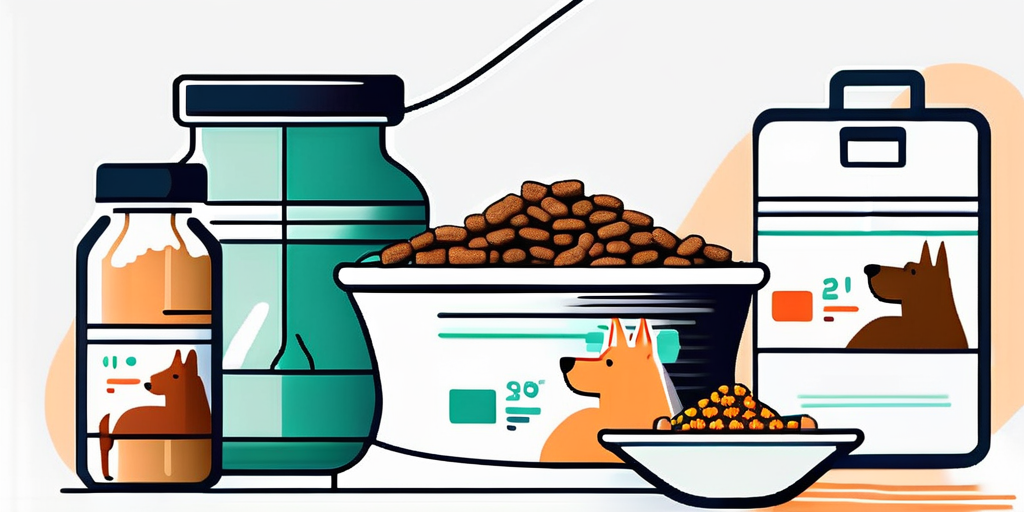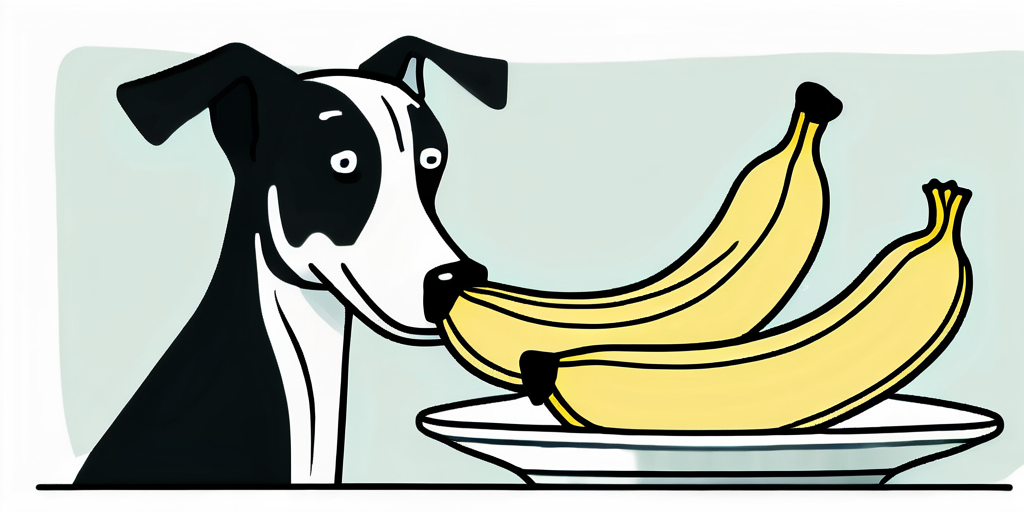Understanding Your Dog’s Nutritional Needs
Dogs, like humans, require a balanced diet to stay healthy and thrive. Providing your furry friend with proper nutrition is essential to ensure their overall well-being and longevity. This includes understanding their specific nutritional needs and whether certain human foods, like bananas, are safe for them to consume.

While dogs are primarily carnivorous, they can benefit from incorporating some fruits and vegetables into their diet. But what about bananas? Are they safe for dogs to eat? Let’s delve deeper into the topic and understand the nutritional content of this popular fruit.
The Importance of a Balanced Diet for Dogs
A balanced diet plays a critical role in maintaining your dog’s health and supporting their bodily functions. It provides the necessary energy, vitamins, and minerals to keep them active, protect their immune system, and promote optimal growth and development.
Incorporating a variety of nutrients from different food groups is vital to ensure your dog receives all the essential building blocks for a healthy body. This includes a combination of high-quality proteins, fats, carbohydrates, vitamins, and minerals.
When it comes to proteins, dogs require a sufficient amount to support muscle growth and repair. High-quality sources of protein include lean meats, fish, and poultry. Fats, on the other hand, provide a concentrated source of energy and play a crucial role in maintaining healthy skin and coat. Sources of healthy fats for dogs include fish oil, flaxseed oil, and chicken fat.
Carbohydrates are an important source of energy for dogs, but it’s essential to choose complex carbohydrates that provide sustained energy release. Whole grains like brown rice and oats are excellent choices. Additionally, fruits and vegetables can contribute to your dog’s carbohydrate intake while providing essential vitamins and minerals.
Common Human Foods: Are They Safe for Dogs?
Many human foods can be harmful to dogs, causing unpleasant symptoms or even serious health issues. However, bananas are generally safe for dogs when given in moderation. They offer several nutritional benefits and can be a healthy addition to your dog’s diet when provided in the right amounts.
Bananas are a good source of potassium, vitamin C, and dietary fiber. Potassium is essential for maintaining proper heart and muscle function, while vitamin C supports the immune system. The dietary fiber in bananas can aid in digestion and promote healthy bowel movements for your furry friend.
However, it’s important to note that every dog is different, and some may be more sensitive to certain foods than others. Before introducing bananas or any new food into your dog’s diet, it’s crucial to consult with your veterinarian to ensure it suits your dog’s individual needs and health conditions.
In conclusion, understanding your dog’s nutritional needs is key to providing them with a balanced diet. While dogs are primarily carnivorous, incorporating fruits and vegetables, like bananas, can offer additional health benefits. However, it’s important to consult with your veterinarian before making any significant changes to your dog’s diet. With the right knowledge and guidance, you can ensure your furry friend receives the nutrition they need to live a happy and healthy life.
The Nutritional Content of Bananas
To determine whether bananas are suitable for your dog, it’s essential to understand the nutritional content they offer. Bananas are not only a rich source of vitamins and minerals but also contain dietary fiber that can benefit your furry friend’s digestive system.

But let’s dive deeper into the nutritional value of bananas for dogs. Did you know that bananas are not only a tasty treat but also a powerhouse of key vitamins and minerals?
Key Vitamins and Minerals in Bananas
Bananas are packed with various essential vitamins and minerals that can contribute to your dog’s overall health. They contain vitamin C, which is known for its immune-boosting properties. This vitamin plays a crucial role in supporting your dog’s immune system, helping them fight off infections and stay healthy.
Additionally, bananas offer potassium, an important mineral that supports heart function and regulates blood pressure. Potassium is vital for maintaining proper muscle and nerve function, making it an essential nutrient for your dog’s well-being.
But that’s not all! Vitamin B6 is another nutrient found in bananas, which aids in brain development and the production of red blood cells. This vitamin is crucial for your dog’s cognitive function and overall vitality.
As you can see, these vitamins and minerals work together to ensure your dog’s body functions optimally, promoting their overall health and well-being.
The Role of Fiber in a Dog’s Diet
Bananas are not only rich in vitamins and minerals but also a great source of dietary fiber, which can promote a healthy digestive system in dogs. Fiber plays a crucial role in maintaining regular bowel movements and preventing constipation, which can be a common issue in some dogs.
By including bananas in your dog’s diet, you can provide them with a natural source of fiber that supports their gastrointestinal health. Fiber acts as a gentle cleanser for their digestive tract, helping to remove any waste and promoting a healthy gut.
However, it’s important to be mindful of the serving size when feeding your dog bananas. While fiber is beneficial, too much of it can lead to loose stools or an upset stomach. So, moderation is key when it comes to incorporating bananas into your dog’s diet.
In conclusion, bananas are not only a delicious and nutritious fruit for humans but can also provide numerous health benefits for your furry friend. With their rich vitamin and mineral content, as well as their fiber content, bananas can be a valuable addition to your dog’s diet. So, the next time you enjoy a banana, consider sharing a small piece with your canine companion!
Can Dogs Safely Eat Bananas?
Now that we understand the nutritional value of bananas, let’s explore whether they are safe for dogs to eat. In general, bananas are considered safe for most dogs when given in moderation as a treat or an occasional addition to their diet.

Potential Health Benefits of Bananas for Dogs
Bananas offer certain health benefits that make them a valuable addition to your dog’s diet. The high levels of potassium can help support your dog’s cardiovascular health and regulate their blood pressure, reducing the risk of heart disease.
The vitamin C in bananas can also boost your dog’s immune system, enhancing their ability to fight off infections and diseases. Additionally, the natural sugars present in bananas provide a quick energy boost for your furry friend, making them an excellent choice for active dogs.
Possible Risks and Side Effects
While bananas are generally safe, there are a few considerations to keep in mind. One potential risk is the sugar content in bananas. Although the natural sugars are not harmful in moderation, excessive consumption can lead to weight gain and other health issues.
Furthermore, some dogs may be more prone to allergies or food sensitivities, and bananas could trigger adverse reactions in these cases. Signs of an allergic reaction may include itching, gastrointestinal upset, or respiratory distress. If you notice any of these symptoms after giving your dog bananas, consult your vet immediately to rule out any underlying issues.
How to Feed Bananas to Your Dog
If you’ve determined that bananas are safe for your dog to consume, it’s important to know how to prepare and serve them properly.
Preparing Bananas for Your Dog
When providing bananas to your dog, it’s best to peel and slice them into bite-sized pieces. This not only makes them easier to eat but also helps prevent any choking hazards. Avoid seasoning or adding any additional ingredients to the banana slices, as some spices can be harmful to dogs.
Recommended Serving Size and Frequency
As with any treat or addition to your dog’s diet, moderation is key. The recommended serving size of bananas for dogs is small pieces or slices—about half an inch thick—for small to medium-sized dogs. Larger dogs may be given slightly bigger pieces.
Remember that bananas should not replace your dog’s regular diet but instead serve as an occasional treat. Overfeeding bananas or any other human food to your dog can upset their nutritional balance and lead to harmful consequences.
When to Consult a Vet
While bananas are generally safe for dogs, every dog is different, and it’s essential to monitor their response to any new food. If you have any concerns or notice unusual symptoms after giving your dog bananas, it’s crucial to consult with your veterinarian.
Signs of Allergic Reactions in Dogs
Allergic reactions in dogs can vary, but common signs include itching, redness, swelling, hives, vomiting, or diarrhea. If your dog experiences any of these symptoms after eating bananas or any other food, stop giving it to them immediately and seek veterinary advice.
Understanding Food Intolerance in Dogs
Food intolerance can also occur, even if a dog isn’t allergic to a specific ingredient. Symptoms of food intolerance may include gastrointestinal upset, such as gas, bloating, or loose stools. If you notice persistent digestive issues after introducing bananas, consult your vet to determine the best course of action.
Ensure you always prioritize your dog’s health and well-being when making dietary choices for them, and consult with a veterinarian for personalized guidance based on your dog’s specific needs and health conditions.
Remember, while bananas can be a healthy addition to your dog’s diet, they should never replace a complete and balanced canine meal plan. By understanding your dog’s nutritional requirements and seeking professional advice, you can make informed decisions about their diet and provide them with the best care possible.
